 |
Life With Louis . . . |
Beau L'Amour:
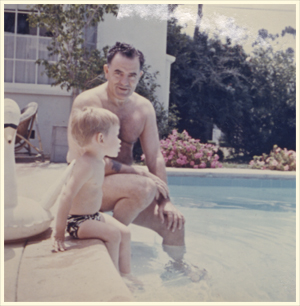 Louis was 53 when I was born. He'd had an adventurous life but during my childhood and young adulthood he came off mostly as a kind, quiet man who sat in a little room (and toward the end of his life a much bigger room) and typed. Dad was moderately well known but not easily recognized and Los Angeles was full celebrities who were vastly more interesting to the public. We lived in a funky, bohemian, neighborhood called West Hollywood. Dad was a guy who had been sort of a funky bohemian himself … long before that was cool, before Kerouac and Guthrie. When the 1960s got to be a bit much even for him he started becoming slightly more conservative … but we lived at ground zero for 1960s counter culture in LA. It was a very creative time and place and he thrived on it.
Louis was 53 when I was born. He'd had an adventurous life but during my childhood and young adulthood he came off mostly as a kind, quiet man who sat in a little room (and toward the end of his life a much bigger room) and typed. Dad was moderately well known but not easily recognized and Los Angeles was full celebrities who were vastly more interesting to the public. We lived in a funky, bohemian, neighborhood called West Hollywood. Dad was a guy who had been sort of a funky bohemian himself … long before that was cool, before Kerouac and Guthrie. When the 1960s got to be a bit much even for him he started becoming slightly more conservative … but we lived at ground zero for 1960s counter culture in LA. It was a very creative time and place and he thrived on it.
Dad was very open minded, he probably had the least prejudice of anyone I have ever met. He had seen all sorts of things in his life and been all sorts of places. He had worked and slept shoulder to shoulder with men of all races. He had shared humor and terror with them. He’d been at the bottom of the social ladder and at the top and knew there wasn’t as much difference as many would suspect.
He was not arrogant about his beliefs or his culture or his country. If he had a political or religious persuasion it was this … he was an optimist. He believed that, working together, people can make things better. He had lived through the bank failures of the teens and ‘20s, promoted Black boxers in towns dominated by the Klu Klux Klan during the Depression and fought in World War Two. He was an older guy with a beautiful young wife, two kids and a decent income. Yet he didn’t even have a 10th grade education. Generally, he thought life was pretty good.
He also knew he’d been very, very, lucky. His career would have been impossible for him to replicate had he started just 20 years later.
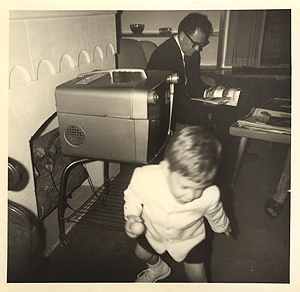 It is important for a modern audience to remember that the authors of “paperback originals” were not paid very well. And when Louis was writing short stories the wages were pitiful! We lived a comfortable middle class existence if Louis wrote two to three books a year. We were a one car, one phone, one TV household. If Dad sold a movie, we might have just enough to get a new car. Constant writing kept the money coming in. Louis worked seven days a week and a minimum of eight hours a day. Vacations were always work oriented. At a certain point, around the mid 1970s, Louis’s fortunes started to change. Each book that came out reinforced the sales of the previous ones. His work changed from being a bunch of discrete titles into being something like an investment. Louis only “made it” about ten years before he died.
It is important for a modern audience to remember that the authors of “paperback originals” were not paid very well. And when Louis was writing short stories the wages were pitiful! We lived a comfortable middle class existence if Louis wrote two to three books a year. We were a one car, one phone, one TV household. If Dad sold a movie, we might have just enough to get a new car. Constant writing kept the money coming in. Louis worked seven days a week and a minimum of eight hours a day. Vacations were always work oriented. At a certain point, around the mid 1970s, Louis’s fortunes started to change. Each book that came out reinforced the sales of the previous ones. His work changed from being a bunch of discrete titles into being something like an investment. Louis only “made it” about ten years before he died.
In that last decade of his life Dad bought a ranch in Colorado but we did not have a “ranchy/horsey/cowboy-like” lifestyle at any time. For the most part Dad was too busy for that sort of stuff and we didn’t have the money.
Even in his early life Dad did not have that sort of lifestyle. He lived and worked in the American West but it was a west of miners and loggers and fruit pickers. His was more the West of John Steinbeck than Zane Grey, more the West of a shovel than a lariat. Many times he may have wished he was a cowboy, he certainly knew a few, but that wasn’t him, personally.
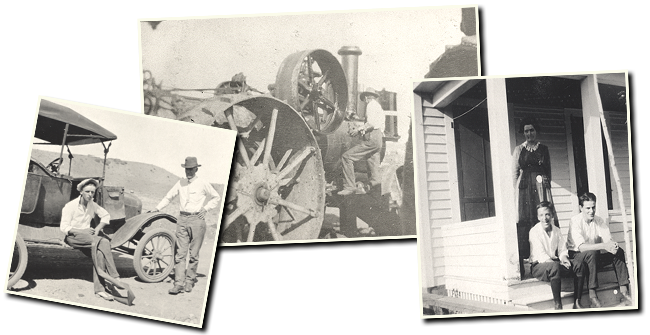
Louis was one of the least materialistic people I have ever known. He liked good clothes but didn’t wear western styles until later in life and then mostly when he was doing personal appearances. He didn’t have western antiques or a gun collection or anything like that. He had books. That was just about the only material thing he cared about and even then he just wanted the information within them, they weren’t first editions or anything. He loved prowling used book stores and libraries. Only some of his personal books were about the American West … about one quarter of them, I’d say.
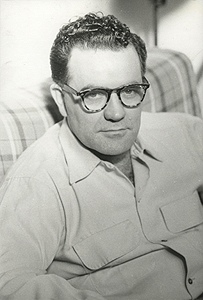 Life with Louis was a good deal of fun. He could always take a short break from work and he had a very goofy sense of humor. He liked to get up before anyone else in the house, he had some sort of macho thing about it. But then he would start feeling lonely … soon he was playing practical jokes on us to get us out of bed. The most obnoxious one I can recall was to put a sound effect record of steam railroad trains on the record player and turn it up really loud. It never failed to get us all putting pillows over our ears and yelling, “Dad! Knock it off!”
Life with Louis was a good deal of fun. He could always take a short break from work and he had a very goofy sense of humor. He liked to get up before anyone else in the house, he had some sort of macho thing about it. But then he would start feeling lonely … soon he was playing practical jokes on us to get us out of bed. The most obnoxious one I can recall was to put a sound effect record of steam railroad trains on the record player and turn it up really loud. It never failed to get us all putting pillows over our ears and yelling, “Dad! Knock it off!”
He was not a “man’s man,” he didn’t drink more than a glass of wine or half a beer a couple of times a year. He didn’t use swear words unless it was to be funny. He didn’t like hanging out with guys or going to sporting events … his vision of what men did was work. He worked a lot. He came from an era when it was hard to find a job, when the economy was defined, especially if you didn’t have an education, by what the captains of industry would let you do. Once he became a writer he could work when he wanted, be his own boss, succeed as much as his imagination would allow. To him work was freedom … it was even rebellion.
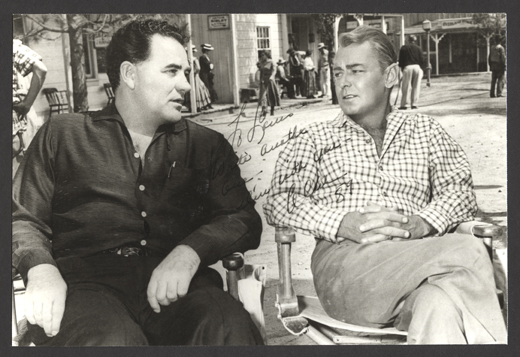
Louis and Alan Ladd on the set in 1959
Dad had a great deal of physical presence, think Sean Connery. He was pretty quiet until you asked him a question … then he could talk ‘til dawn. He would exercise every day, he liked to walk and, like a lot of writers, he drank a lot of coffee.
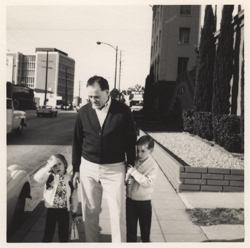 He loved Los Angeles, smog, riots, traffic and all. LA was where it was happening after WWII. Not just movies but aircraft, computers, the space program, chemistry and physics. He hung out with Aldous Huxley, Ray Bradbury and Chuck Yeager. For awhile he had a number of friends and acquaintances in the film business, Alan Ladd, Marlon Brando, Katherine Hepburn, Rock Hudson and Steve McQueen. Some of them died, some got very weird, eventually we discovered that life was calmer without the weird ones around.
He loved Los Angeles, smog, riots, traffic and all. LA was where it was happening after WWII. Not just movies but aircraft, computers, the space program, chemistry and physics. He hung out with Aldous Huxley, Ray Bradbury and Chuck Yeager. For awhile he had a number of friends and acquaintances in the film business, Alan Ladd, Marlon Brando, Katherine Hepburn, Rock Hudson and Steve McQueen. Some of them died, some got very weird, eventually we discovered that life was calmer without the weird ones around.
The publishing business is centered in New York. That was a favorite city of Louis’s. He loved the theater … he would have spent his life writing for the theater if he had known how. My childhood memories of NYC look very much like the sets of Mad Men but publishing offices were more crowded and not as clean.
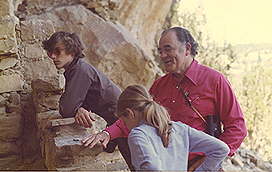 We did a fair amount of traveling around the west in our car. Dad didn’t drive, so Mom was the hero of those trips. We traveled all around the country. My sister and I amused ourselves by provoking our beagle who, when she wasn’t barking at everything that passed the car she was scrambling over all of us so she could bark at everything that passed the car. If one of us said the word, “cattle” she would go insane. “Cattle” and “cookies” were the only two words she would reliably recognize.
We did a fair amount of traveling around the west in our car. Dad didn’t drive, so Mom was the hero of those trips. We traveled all around the country. My sister and I amused ourselves by provoking our beagle who, when she wasn’t barking at everything that passed the car she was scrambling over all of us so she could bark at everything that passed the car. If one of us said the word, “cattle” she would go insane. “Cattle” and “cookies” were the only two words she would reliably recognize.
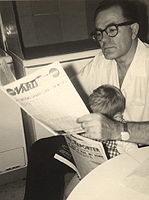 When everything calmed down Dad would read to us as we drove. He read to us at the breakfast table too. Every morning. All sorts of stuff, a lot of it was his research materials. We didn’t care, it was usually entertaining.
When everything calmed down Dad would read to us as we drove. He read to us at the breakfast table too. Every morning. All sorts of stuff, a lot of it was his research materials. We didn’t care, it was usually entertaining.
Of all the things Dad had done in his life I think he remembered going to sea the most fondly. I don’t know if those had really been good times for him but it was an experience he couldn’t go revisit later in life, like he could travel to Kingman where he had worked in the mines or Portland where he’d worked in lumber mills.
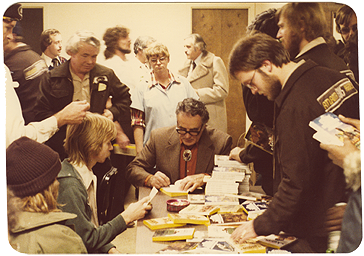
He loved his fans and he had great faith in them. Publishers were sure he couldn’t move from Westerns to other genres … he was positive his fans would follow and enjoy whatever he did. If he were alive today he’d probably be trying to figure out how to create computer games and he’d still be sure his fans would be there for him, even the old ones who “hate that new fangled stuff.”
Louis was a poet and a sports writer, he started writing for TV almost as soon as shows were on the air, he invested in Broadway shows, kept trying to create an opera about Cortez and sold stories to comic books in the 1950s. Dad pressed Bantam Audio to do books on tape in the style of Radio Drama and wanted to write Science Fiction and Horror. He did a lot of one thing, writing westerns, but that doesn’t mean that was all he ever wanted to do!